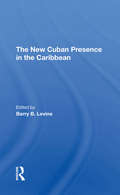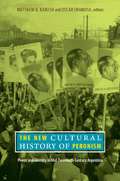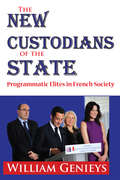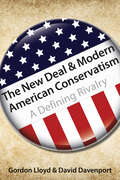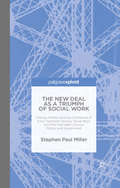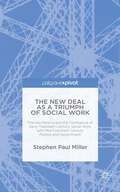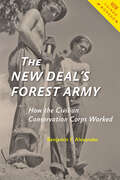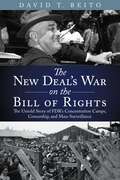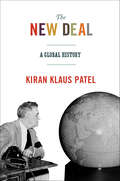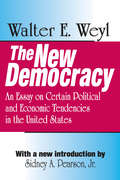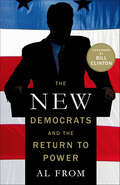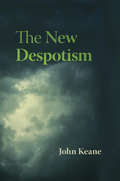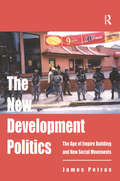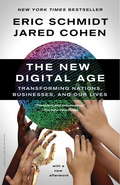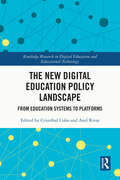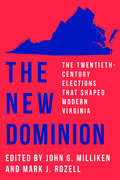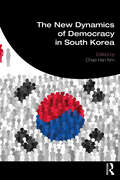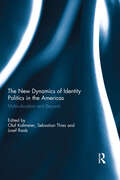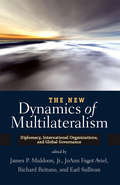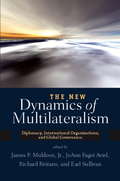- Table View
- List View
The New Cuban Presence In The Caribbean
by Barry B Levine Franklin W KnightThe Caribbean area projects an image—not entirely accurate—of instability, and it is within that context that the United States and Cuba, the region's chief protagonists, struggle. This book explores in detail the history and nature of Cuba's influence in the Commonwealth Caribbean, Mexico, and Central and South America, as well as its relations wi
The New Cultural History of Peronism: Power and Identity in Mid-Twentieth-Century Argentina
by Matthew B. Karush Oscar ChamosaIn nearly every account of modern Argentine history, the first Peronist regime (1946-55) emerges as the critical juncture. Appealing to growing masses of industrial workers, Juan Pern built a powerful populist movement that transformed economic and political structures, promulgated new conceptions and representations of the nation, and deeply polarized the Argentine populace. Yet until now, most scholarship on Peronism has been constrained by a narrow, top-down perspective. Inspired by the pioneering work of the historian Daniel James and new approaches to Latin American cultural history, scholars have recently begun to rewrite the history of mid-twentieth-century Argentina. The New Cultural History of Peronism brings together the best of this important new scholarship. Situating Peronism within the broad arc of twentieth-century Argentine cultural change, the contributors focus on the interplay of cultural traditions, official policies, commercial imperatives, and popular perceptions. They describe how the Pern regime's rhetoric and representations helped to produce new ideas of national and collective identity. At the same time, they show how Argentines pursued their interests through their engagement with the Peronist project, and, in so doing, pushed the regime in new directions. While the volume's emphasis is on the first Pern presidency, one contributor explores the origins of the regime and two others consider Peronism's transformations in subsequent years. The essays address topics including mass culture and melodrama, folk music, pageants, social respectability, architecture, and the intense emotional investment inspired by Peronism. They examine the experiences of women, indigenous groups, middle-class anti-Peronists, internal migrants, academics, and workers. By illuminating the connections between the state and popular consciousness, The New Cultural History of Peronism exposes the contradictions and ambivalences that have characterized Argentine populism. Contributors: Anahi Ballent, Oscar Chamosa, Mara Damilakou, Eduardo Elena, Matthew B. Karush, Diana Lenton, Mirta Zaida Lobato, Natalia Milanesio, Mariano Ben Plotkin, Csar Seveso, Lizel Tornay
The New Custodians of the State: Programmatic Elites in French Society
by William GenieysThe New Custodians of the State uses contemporary France to reassess sociological theories of political and policymaking elites. Based on detailed case studies drawn from social policy and national defense sectors, it concludes that a new type of sectorally-based elite has risen to prominence in France since the 1980s. Genieys suggests that programmatic elites found in specific policy sectors, made up of individuals linked both by common career paths and the resulting skills and expertise, should be seen as new guardians of state power.Like their technocratic predecessors, programmatic elites maintain a high degree of independence with respect to electoral politics and to civil society; like them, they share an ideological commitment to protect and expand the role of the state in French society. Unlike them, however, these new guardians of the state are structured around specific policy programs and limited in scope to a given sector. Competition among programmatic elites at the highest levels of the state emerges as the chief driving force behind innovation for social change.The New Custodians of the State introduces programmatic elites both as real-world actors and as an analytic category and highlights the limits of elite power by analyzing the defeat of efforts by the French Ministry of Defense. This book presents a thought-provoking critical case study that suggests that models presenting either a single unified state elite or those that herald or decry the demise of the state require modification. The work will be of interest to students and scholars of France, and its society and government as well as anyone interested in the policymaking process in other countries with respect to domestic policy or national defense.
The New Deal & Modern American Conservatism: A Defining Rivalry
by Gordon Lloyd David DavenportProviding an often-overlooked historical perspective, Gordon Lloyd and David Davenport show how the New Deal of the 1930s established the framework for today's U.S. domestic policy and the ongoing debate between progressives and conservatives. They examine the pivotal issues of the dispute, laying out the progressive-conservative arguments between Hoover and Roosevelt in the 1930s and illustrating how those issues remain current in public policy today. The authors detail how Hoover, alarmed by the excesses of the New Deal, pointed to the ideas that would constitute modern U.S. conservatism and how three pillars—liberty, limited government, and constitutionalism—formed his case against the New Deal and, in turn, became the underlying philosophy of conservatism today. Illustrating how the debates between Franklin Roosevelt and Herbert Hoover were conducted much like the campaign rhetoric of liberals and conservatives in 2012, Lloyd and Davenport assert that conservatives must, to be a viable part of the national conversation, “go back to come back”—because our history contains signposts for the way forward.
The New Deal And The Problem Of Monopoly: A Study in Economic Ambivalence
by Ellis W. HawleyThe massive depression of the 1930's detonated the crisis between harsh reality and the vision of material abundance and economic security created by the American industrial order. Amid widespread poverty there was increasing concentration of economic power and loss of individual initiative. Professor Hawley traces the pattern of this conflict. He analyzes the National Recovery Administration, the sources and nature of the antitrust ideology, the rise of Keynesianism, the confusion within the Roosevelt Administration during the recession of 1937-38, and the government career of Thurman Arnold. Attention is given to the administrators of the New Deal and to the beliefs, pressures, and symbols that affected their policy decisions. How and why these ideas and pressures produced policies that were economically inconsistent yet politically workable is also explained.
The New Deal as a Triumph of Social Work: Frances Perkins and the Confluence of Early Twentieth Century Social Work with Mid-Twentieth Century Politics and Government
by S. MillerThe New Deal as a Triumph of Social Work concerns the 'hand' the New Deal plays from the perspective of early American History in which government and business cooperation is assumed and economic rights are addressed collectively whereas political rights are considered individually. The New Deal reconfigures this 'ratio' of rights by folding 'social work' into the aims of government. Miller describes the vital part Frances Perkins and her personal history play in this development.
The New Deal as a Triumph of Social Work: Frances Perkins and the Confluence of Early Twentieth Century Social Work with Mid-Twentieth Century Politics and Government
by Stephen Paul MillerThe New Deal as a Triumph of Social Work
The New Deal's Forest Army: How the Civilian Conservation Corps Worked (How Things Worked)
by Benjamin F. AlexanderHow the Civilian Conservation Corps constructed, rejuvenated, and protected American forests and parks at the height of the Great Depression.Propelled by the unprecedented poverty of the Great Depression, President Franklin D. Roosevelt established an array of massive public works programs designed to provide direct relief to America’s poor and unemployed. The New Deal’s most tangible legacy may be the Civilian Conservation Corps’s network of parks, national forests, scenic roadways, and picnic shelters that still mark the country’s landscape. CCC enrollees, most of them unmarried young men, lived in camps run by the Army and worked hard for wages (most of which they had to send home to their families) to preserve America’s natural treasures. In The New Deal’s Forest Army, Benjamin F. Alexander chronicles how the corps came about, the process applicants went through to get in, and what jobs they actually did. He also explains how the camps and the work sites were run, how enrollees spent their leisure time, and how World War II brought the CCC to its end. Connecting the story of the CCC with the Roosevelt administration’s larger initiatives, Alexander describes how FDR’s policies constituted a mixed blessing for African Americans who, even while singled out for harsh treatment, benefited enough from the New Deal to become an increasingly strong part of the electorate behind the Democratic Party. The CCC was the only large-scale employment program whose existence FDR foreshadowed in speeches during the 1932 campaign—and the dearest to his heart throughout the decade that it lasted. Alexander reveals how the work itself left a lasting imprint on the country’s terrain as the enrollees planted trees, fought forest fires, landscaped public parks, restored historic battlegrounds, and constructed dams and terraces to prevent floods. A uniquely detailed exploration of life in the CCC, The New Deal’s Forest Army compellingly demonstrates how one New Deal program changed America and gave birth to both contemporary forestry and the modern environmental movement.
The New Deal's War on the Bill of Rights: The Untold Story of FDR's Concentration Camps, Censorship, and Mass Surveillance
by David T. BeitoSpying on citizens. Censoring critics. Imprisoning minorities. These are the acts of dictators, not American presidents.... Or are they?The legacy of President Franklin D. Roosevelt enjoys regular acclaim from historians, politicians, and educators. Lauded for his New Deal policies, leadership as a wartime president, cozy fireside chats, and groundbreaking support of the &“forgotten man,&” FDR, we have been told, is worthy of the same praise as men like Washington, Jefferson, and Lincoln.... But is that true? Does the father of today&’s welfare state really deserve such generous approbation? Or is there a dark side to this golden legacy? The New Deal&’s War on the Bill of Rights: The Untold Story of FDR&’s Concentration Camps, Censorship, and Mass Surveillance unveils a much different portrait than the standard orthodoxy found in today&’s historical studies. Deploying an abundance of primary source evidence and well-reasoned arguments, historian and distinguished professor emeritus David T. Beito masterfully presents a complete account of the real Franklin D. Roosevelt: a man who abused power, violated human rights, targeted dissidents, and let his crude racism imprison American citizens merely for being of Japanese descent. Read it, and discover how FDR: shamelessly censored critics of his administration, barred them from the public square, destroyed their careers, and even bankrupted them when possible; locked up Japanese-American citizens in concentration camps built on American soil; sowed the seeds of today&’s out-of-control surveillance state; and much, much more... Here is an all too rare portrait of a man who changed the course of American history ... not for the better. Read it, and you&’ll never view the fireside president the same again.
The New Deal: A Global History (America in the World)
by Kiran Klaus PatelThe first history of the new deal in global contextThe New Deal: A Global History provides a radically new interpretation of a pivotal period in US history. The first comprehensive study of the New Deal in a global context, the book compares American responses to the international crisis of capitalism and democracy during the 1930s to responses by other countries around the globe—not just in Europe but also in Latin America, Asia, and other parts of the world. Work creation, agricultural intervention, state planning, immigration policy, the role of mass media, forms of political leadership, and new ways of ruling America's colonies—all had parallels elsewhere and unfolded against a backdrop of intense global debates.By avoiding the distortions of American exceptionalism, Kiran Klaus Patel shows how America's reaction to the Great Depression connected it to the wider world. Among much else, the book explains why the New Deal had enormous repercussions on China; why Franklin D. Roosevelt studied the welfare schemes of Nazi Germany; and why the New Dealers were fascinated by cooperatives in Sweden—but ignored similar schemes in Japan.Ultimately, Patel argues, the New Deal provided the institutional scaffolding for the construction of American global hegemony in the postwar era, making this history essential for understanding both the New Deal and America's rise to global leadership.
The New Dealers' War: FDR and the War Within World War II
by Thomas J. FlemingTom Fleming takes the reader on a journey through the fractious struggles and debates that went on in Washington and the world as the New Dealers, led by F. D. Roosevelt, strove to impose their will on the conduct of the War. He paints a controversial and very different portrait of FDR's leadership.
The New Dealers' War: Franklin D. Roosevelt and the War Within World War II
by Thomas FlemingAcclaimed historian Thomas Fleming brings to life a flawed and troubled FDR struggling to manage World War II. Starting with the leak to the press of Roosevelt's famous Rainbow Plan, then spiraling back to FDR's inept prewar diplomacy with Japan and his various attempts to lure Japan into an attack on the U. S. Fleet in the Pacific, Fleming takes the reader on a journey through the incredibly fractious struggles and debates that went on in Washington, the nation, and the world as the New Dealers strove to impose their will on the conduct of the War. In bold contrast to the familiar, idealized FDR of other biographies, Fleming's Roosevelt is a man in remorseless decline, battered by ideological forces and primitive hatreds that he could not handle and frequently failed to understand, some of them leading to unimaginable catastrophe. Among FDR's most dismaying policies, Fleming argues, is his insistence on "unconditional surrender" for Germany (a policy that perhaps prolonged the war by as much as two years, leaving millions more dead) and his often-uncritical embrace of and acquiescence to Stalin and the Soviets as an ally. The New Dealers' War is one of those rare books that force readers to rethink what they think they know about a pivotal event in the American past.
The New Debtors' Prison: Why All Americans Are in Danger of Losing Their Freedom
by Paul Lonardo Christopher B. MaselliDebtors’ prisons might sound like something out of a Dickens novel, but what most Americans do not realize is that they are alive and well in a new and startling form. Today more than 20 percent of the prison population is incarcerated for financial reasons such as failing to pay a fine. This alarming trend not only affects the poor, who are hit particularly hard, but also ensnares the millions of self-identified middle-class people who are struggling to make ends meet. All across the country people are being fined and even imprisoned for offenses as small as delinquency on student debt or an unpaid parking ticket. However, there is an insidious undercurrent to these practices that the average person might not realize. Many counties depend on a steady supply of citizens to pay fines and court costs in order to make their budgets. Minor vehicle infractions, by design, can rack up hundreds of dollars in charges that go straight to the city’s coffers. Combine this with the fact that many middle-class people cannot handle an unexpected $400 expense and the general lack of awareness about the risk for being repeatedly jailed for failure to pay court costs, probation, and even per day charges for being in jail and you get an endless cycle of men and women either in debt or in prison for debt. While shocking to some, this system makes up today’s debtors’ prisons. In The New Debtors’ Prison, Christopher Maselli draws from his personal knowledge of the criminal justice system based on his experience on both sides of the prison walls as an attorney as well as a former inmate, to take a hard look at our modern prison system that systematically targets the poor and vulnerable of our society in order to fund the prison-industrial complex.
The New Democracy: An Essay on Certain Political and Economic Tendencies in the United States
by Walter E. WeylWhen The New Democracy first appeared in 1912, it was widely regarded as one of the most influential works of the Progressive Era. Yet, despite continuing interest in the political thought of the Progressive Era, both Weyl and The New Democracy slipped into undeserved obscurity shortly after the author's death from cancer in 1919. Despite this, Weyl's book remains one of the most important links in the development of a liberal-progressive theory of democracy.Weyl describes the efforts of a plutocracy seeking to control, often by corrupt means, the federal government. He attacks the Founding Fathers' motives, and reads the Constitution as an anti-democratic document produced by aristocrats attempting to protect their own economic interests in troubled times. In contrast to many of his predecessors, Weyl rejects Natural Law and sees the distribution of wealth as the fundamental issue in political life. For Weyl, rights are not defined by Nature, but by human institutions that distribute wealth. He supported a stronger federal government, one that provides more rights and economic equality for the common citizen.In his opening essay for this new edition of The New Democracy, Sidney A. Pearson, Jr. painstakingly explores Weyl's life, influence, political philosophy, the origins of the book, and the author's subsequent descent into obscurity. This classic work will be of interest to students of political science, government, and American political theory.
The New Democrats and the Return to Power
by Al FromAfter Barack Obama's solid win in the 2012 election, it's easy to forget that there was a time, not long ago, when the Democrats were shut out of power for over a decade. But Al From remembers. In 1984, he led a small band of governors, US senators, and members of Congress to organize the Democratic Leadership Council (DLC). Their mission: to rescue the party from the political wilderness, redefine its message, and, most importantly, win presidential elections. In April 1989, From traveled to Little Rock, Arkansas, to recruit the state's young governor, Bill Clinton, to be chairman of the DLC. Here, Al From explores the founding philosophy of the New Democrats, which not only achieved stunning validation during Clinton's two terms, but also became the model for resurgent center-left parties in Europe and throughout the democratic world. Here, he outlines for the first time the principles at the heart of the movement, including economic centrism, national security, and entitlement reform, and why they are vital to the success of the Democratic Party in the years ahead.
The New Despotism
by John KeaneA disturbing in-depth exposé of the antidemocratic practices of despotic governments now sweeping the world. One day they’ll be like us. That was once the West’s complacent and self-regarding assumption about countries emerging from poverty, imperial rule, or communism. But many have hardened into something very different from liberal democracy: what the eminent political thinker John Keane describes as a new form of despotism. And one day, he warns, we may be more like them. Drawing on extensive travels, interviews, and a lifetime of thinking about democracy and its enemies, Keane shows how governments from Russia and China through Central Asia to the Middle East and Europe have mastered a formidable combination of political tools that threaten the established ideals and practices of power-sharing democracy. They mobilize the rhetoric of democracy and win public support for workable forms of government based on patronage, dark money, steady economic growth, sophisticated media controls, strangled judiciaries, dragnet surveillance, and selective violence against their opponents. Casting doubt on such fashionable terms as dictatorship, autocracy, fascism, and authoritarianism, Keane makes a case for retrieving and refurbishing the old term “despotism” to make sense of how these regimes function and endure. He shows how they cooperate regionally and globally and draw strength from each other’s resources while breeding global anxieties and threatening the values and institutions of democracy. Like Montesquieu in the eighteenth century, Keane stresses the willing complicity of comfortable citizens in all these trends. And, like Montesquieu, he worries that the practices of despotism are closer to home than we care to admit.
The New Development Politics: The Age of Empire Building and New Social Movements
by James PetrasA critique of current conceptions of international political economy, the role of the state and contemporary social movements, The New Development Politics challenges the dominant paradigms in the field of development studies. Raising fundamental theoretical and empirical questions, it provides a coherent response to the increasing militarization of inter-state relations, increasing protectionism and inter-state rivalries and the growing age of state intervention in political, economic and social life. The study presents a critical analysis of US empire-building, the role of dirty money and political power, as opposed to technological change. It features a discussion of neo-mercantilism as a new mode of empire and examines the role of new movements of unemployed and landless peasants in key Third World countries.
The New Digital Age: Reshaping the Future of People, Nations and Business
by Eric Schmidt Jared CohenIn an unparalleled collaboration, two leading global thinkers in technology and foreign affairs give us their widely anticipated, transformational vision of the future: a world where everyone is connected--a world full of challenges and benefits that are ours to meet and to harness. Eric Schmidt is one of Silicon Valley's great leaders, having taken Google from a small startup to one of the world's most influential companies. Jared Cohen is the director of Google Ideas and a former adviser to secretaries of state Condoleezza Rice and Hillary Clinton. With their combined knowledge and experiences, the authors are uniquely positioned to take on some of the toughest questions about our future: Who will be more powerful in the future, the citizen or the state? Will technology make terrorism easier or harder to carry out? What is the relationship between privacy and security, and how much will we have to give up to be part of the new digital age? In this groundbreaking book, Schmidt and Cohen combine observation and insight to outline the promise and peril awaiting us in the coming decades. At once pragmatic and inspirational, this is a forward-thinking account of where our world is headed and what this means for people, states and businesses. With the confidence and clarity of visionaries, Schmidt and Cohen illustrate just how much we have to look forward to--and beware of--as the greatest information and technology revolution in human history continues to evolve. On individual, community and state levels, across every geographical and socioeconomic spectrum, they reveal the dramatic developments--good and bad--that will transform both our everyday lives and our understanding of self and society, as technology advances and our virtual identities become more and more fundamentally real. As Schmidt and Cohen's nuanced vision of the near future unfolds, an urban professional takes his driverless car to work, attends meetings via hologram and dispenses housekeeping robots by voice; a Congolese fisherwoman uses her smart phone to monitor market demand and coordinate sales (saving on costly refrigeration and preventing overfishing); the potential arises for "virtual statehood" and "Internet asylum" to liberate political dissidents and oppressed minorities, but also for tech-savvy autocracies (and perhaps democracies) to exploit their citizens' mobile devices for ever more ubiquitous surveillance. Along the way, we meet a cadre of international figures--including Julian Assange--who explain their own visions of our technology-saturated future. Inspiring, provocative and absorbing, The New Digital Age is a brilliant analysis of how our hyper-connected world will soon look, from two of our most prescient and informed public thinkers.
The New Digital Education Policy Landscape: From Education Systems to Platforms (Routledge Research in Digital Education and Educational Technology)
by Axel Rivas Cristóbal CoboThis book provides a scholarly investigation of the new era we have entered, in which platforms can replace or profoundly modify educational systems, and questions the role of educational policy in this new stage of platform-based digital technology. The contributors explore important questions around who controls these transformations, what form they are taking, what the balance between national education policies and Big Tech education solutions should be, as well as whether there should be a public platform in every education system that digitally expands learning, and what evidence there is that learning will be more efficient using these platforms. The first part provides a selection of empirical studies on the new digital educational policy, and an analysis of the real opportunities and concerns that governments face in this regard, while the second offers reflections on the processes of platformization and the role of the State in this new digital world. Uniquely examining the temporal evolution of these changes and taking a theoretical, political, and epistemological approach, it crucially opens pathways for dialogical, and diverse critical thinking about profound problems and possibilities. Gathering purposeful thinking that creates space for design solutions and rethinking educational systems considering these new technological artifacts, it will appeal to researchers and specialists in the fields of educational technology and educational policy.
The New Dogs of War: Nonstate Actor Violence in International Politics
by Ward ThomasAs Ward Thomas details in The New Dogs of War, militias and paramilitary groups wield greater power than national governments in many countries, while in some war zones private contractors perform missions previously reserved for uniformed troops. Most ominously, terrorist organizations with global reach have come to define the security landscape for even the most powerful nations. Across the first decades of the twenty-first century we have witnessed a dramatic rise in the use of military force by these nonstate actors in ways that have impacted the international system, leading Thomas to undertake this valuable assessment of the state of play at this critical moment. To understand the spread of nonstate violence, Thomas focuses on the crucial role played by an epochal transformation in international norms. Since the eighteenth century, the Westphalian model of sovereignty has reserved the legitimate use of force to states. Thomas argues that normative changes in the decades after World War II produced a "crisis of coherence" for formal and informal rules against nonstate violence. In detailed case studies of nonstate militias, transnational terrorist networks, and private military contractors, Thomas explains how forces contesting state prerogatives exploited this crisis, which in turn reshaped international understandings of who could legitimately use force. By considering for the first time all three purveyors of nonstate violence as aspects of the same phenomenon, The New Dogs of War explains this fundamental shift in the norm that for centuries gave states the monopoly on military force.
The New Dominion: The Twentieth-Century Elections That Shaped Modern Virginia
by Mark J. Rozell John G. MillikenThe New Dominion analyzes six key statewide elections to explore the demographic, cultural, and economic changes that drove the transformation of the state’s politics and shaped the political Virginia of today. Countering the common narrative that the shifting politics of Virginia is a recent phenomenon driven by population growth in the urban corridor, the contributors to this volume consider the antecedents to the rise of Virginia as a two-party competitive state in the critical elections of the twentieth century that they profile.
The New Dynamics of Democracy in South Korea
by Chae-Han KimSouth Korea has been through important changes since its democratization in the late 1980s – most recently in 2016–2017 when the candlelight protests led to the ousting of Park Geun-hye and the election of Moon Jae-in. Taking a thematic approach to understanding South Korean democracy, each chapter in this textbook is written by a leading Korean expert on a different element of South Korean politics and government. Covering themes such as intergenerational differences, the instability of the party system, the role of the president, and the impact of the 2016 demonstrations, this is a vital and lively introduction to Korean politics. This systematic and nuanced approach helps you understand the past, present, and possible futures of South Korea’s democracy. It also helps in understanding South Korea’s system for the purposes of comparing it with other political systems. The New Dynamics of Democracy in South Korea is an invaluable textbook for students of Korean politics, which will also be a useful resource for scholars of comparative democracy.
The New Dynamics of Identity Politics in the Americas: Multiculturalism and Beyond
by Olaf Kaltmeier, Sebastian Thies and Josef RaabMulticulturalism has shaped identity politics in the Americas over the past decades, as illustrated by politics of recognition, affirmative action, and increasing numbers of internationally recognized cultural productions by members of ethnic minorities. Hinting at postcolonial legacies in political rhetoric and practice multiculturalism has also served as a driving force behind social movements in the Americas. Nevertheless, in current academic discussions and public debates on migration, globalization and identity politics, concepts like new ethnicities, ethnic groupism, creolization, hybridity, mestizaje, diasporas, and "post-ethnicity" articulate positionings that are profoundly changing our understanding of "multiculturalism." Combining theoretical reflections with case studies the aim of this book is to demonstrate the current dynamics of (post-) multicultural politics in the Americas.This book was based on a special issue of Latin American and Caribbean Ethnic Studies.
The New Dynamics of Multilateralism: Diplomacy, International Organizations, and Global Governance
by James P. MuldoonThis timely new book focuses on the various dynamics of contemporary multilateralism as it relates to global issues, global governance, and global institutions. Invited authorities, including academics, business people, and members of international groups, contribute original essays on how multilateralism as an institution has been affected by globalization, the rise of civil society and global business, emerging economic and political conditions, and new threats to peace and security in the world. Emphasizing practical applications over theoretical foundations, The New Dynamics of Multilateralism helps students understand how the practice of multilateral diplomacy has been influenced by the changes in the processes and procedures of international organizations and the role of multilateralism in the transformation of the international system of governance and the transition to an emerging new global order.
The New Dynamics of Multilateralism: Diplomacy, International Organizations, and Global Governance
by Richard Reitano Earl Sullivan Joann Fago Muldoon Jr.With contributions from scholars and practitioners, this volume focuses on the practical applications of multilateralism and how global issues, governance, and institutions are changing the practice and character of diplomacy.
